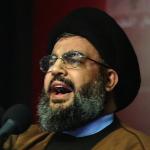The Crime That Could Fell Hezbollah
 Hezbollah is about to be accused of a crime, and it is doing everything it can to warn its accusers to stand down.
Hezbollah is about to be accused of a crime, and it is doing everything it can to warn its accusers to stand down.
Hezbollah's political headquarters in Beirut fronts a busy four-lane road heading south toward the airport, about 50 yards from a KFC franchise. The building is unmarked, but it takes no great feat of pathfinding to reach: The Israeli air force smashed the predecessor building in the early hours of the 2006 Hezbollah war and could, of course, repeat the performance any time. The ground floor was formerly occupied by a dress store, now closed. Above is a low-rise middle-class residential building, now converted to offices.
To arrive you pull off the road into a small paved parking lot. On the day I visited, the lot was guarded only by a length of chain and an attendant in civilian clothes: no militiamen, no visible guns. A big arched entry led immediately to a wide flight of stairs. I walked up the steps to what had once been the door of an apartment. Inside there was a reception area, a little kitchen and then a big room, now the office of Hezbollah's international affairs director, Ammar al-Moussawi.
At one end of the room, a desk, office chair and computer. At the other end, a television set flanked by two armchairs faced back into the room. Along the long walls, two pairs of Middle Eastern style couches upholstered in kilim patterns. Above the couches, a portrait of the Ayatollah Khomeini. Above the armchairs, a photograph of Hezbollah's Secretary General, Hassan Nasrallah.
A member of my group familiar with the premises noted later a recent improvement to the decoration of the room. Since his last visit, a third picture had been removed. That picture was a photograph of Imad Mughniyah, the terrorist who organized the suicide truck bombings of U.S. and French barracks and other targets in Beirut in 1983; kidnappings and assassinations in Lebanon through the 1980s; and the bombings of the Israel embassy and Jewish community centre in Buenos Aires in 1992 and 1993. (Mughniyah was killed by persons unknown in a car bomb in Damascus in February 2008.)
Ammar al-Moussawi was dressed all in black, mourning garb for the Shiite holy week, Ashura. Al-Moussawi smoked Marlboros by the pack. Over almost 90 minutes of conversation, he kept his body motionless, not even recrossing his legs. His face showed no emotion of any kind as he answered questions and delivered a message, not for direct quotation.
But if the tone was calm, the message was desperately anxious.
Hezbollah is about to be accused of a crime, and it is doing everything it can to warn its accusers to stand down.
You might think: one more crime? What's new there? The answer is that this crime could expose Hezbollah to devastating retaliation right here on its home ground.
Five years ago, on Feb. 14, 2005, a huge explosion destroyed the armored car of Lebanese prime minister Rafiq Hariri. In the aftermath, the United Nations appointed a special tribunal to investigate. The tribunal will soon announce its indictment, and it is widely expected that the indictment will name senior officials of Hezbollah as the organizers of the killing.
Hezbollah professes to fear that a public indictment would invite Sunni terrorist attacks on Shiite civilians. If this fear of Sunni retaliation were sincere, you would have to wonder why Hezbollah's own headquarters is so lightly guarded. Hezbollah holds overwhelming military supremacy in Lebanon; Sunni extremist groups have little power here.
But here's what could happen. An indictment in the Hariri case could mobilize Sunni Arabs outside Lebanon to demand a more effective international campaign against Hezbollah. Hezbollah has achieved something close to international legitimacy. It participates in the Lebanese government. It receives foreign ambassadors. The world looks away as it imports missiles from Iran.
All these achievements would be jeopardized if Hezbollah were formally condemned by an international organization for terror against fellow-Lebanese and fellow-Muslims. And jeopardized at a fragile moment.
Hezbollah serves now as an Iranian second-strike weapon against Israel. Should Israel ever feel compelled to attack Iranian nuclear facilities, Hezbollah could be unleashed against Israel. A restrained Hezbollah equals a more vulnerable Iran.
So Hezbollah now breathes menace against the tribunal. Hezbollah's friends -- like Turkish Prime Minister Recep Erdogan -- are calling for the tribunal to go slow, keep its findings confidential. Meanwhile another suspect in the killing -- the government of Syria -- has regained international respectability. On the front page of Beirut's English-language Daily Star, there appeared Friday a big photo of Syrian leader Bashir Assad and his wife lunching with Nicholas Sarkozy and Carla Bruni in a gilt room in Paris. Nervous Lebanese politicians are searching for ways to appease Hezbollah: some kind of deal to quash the UN tribunal before its indictments released.
The hunt is on to substitute some more convenient killer: Sunni extremists? Rogue Palestinian groups? The Russian mafia, angry at some business deal gone bad? Or ...wait a minute ...how about...Israel?
Here is the English-language newspaper of the Iranian government, the Tehran Times, on Oct. 23, 2010 -- about the time the tribunal was finishing its work: "The Hariri assassination: Israel's fingerprints surface."
Yes, that might work. It always does.
Originally published in the National Post.